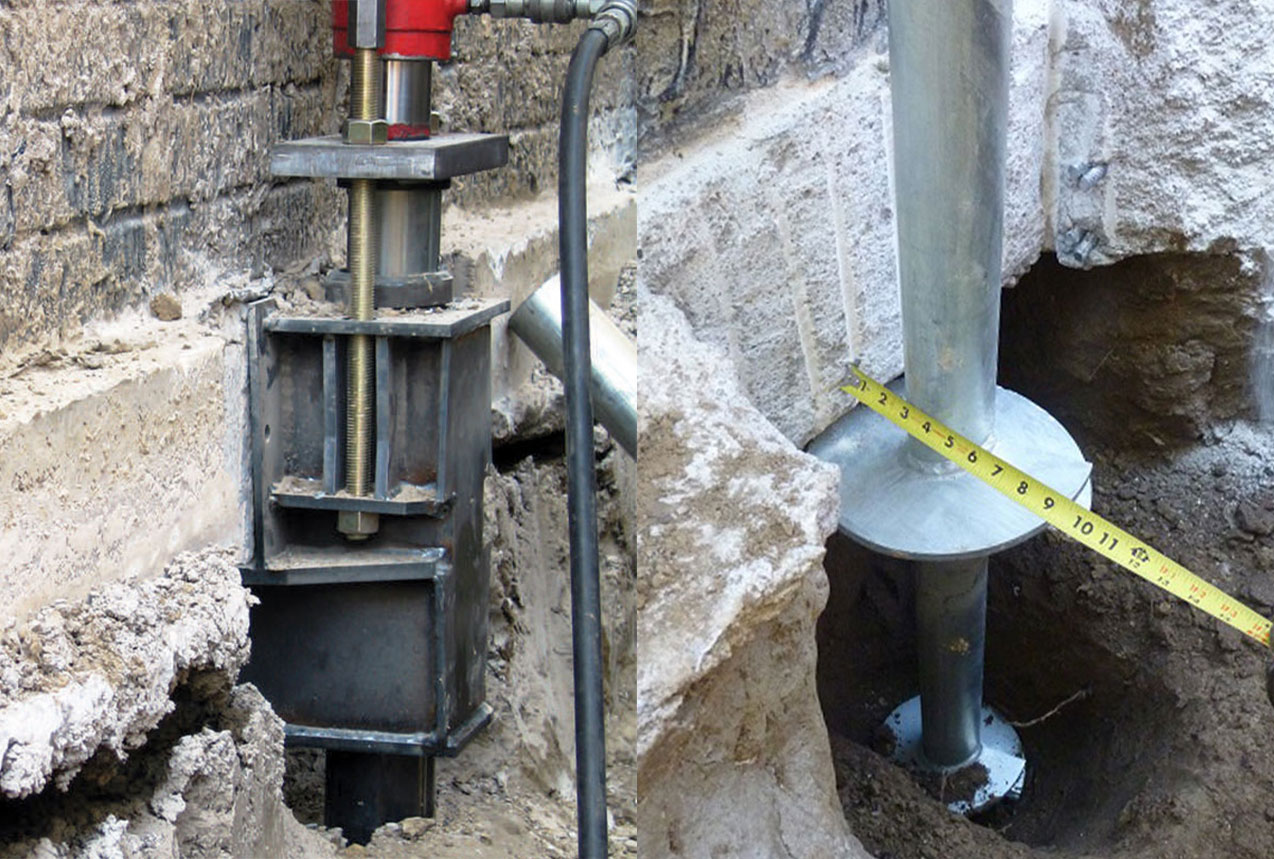Foundation problems are a common concern for homeowners in Louisville, KY, and surrounding areas. Signs like cracks in walls, uneven floors, and doors that don’t close properly often indicate a foundation issue. Various factors, including soil conditions, water damage, and construction on unstable fill material can cause these problems.
Foundation piers are a crucial solution for stabilizing buildings with compromised foundations. At Kentuckiana Contracting Services (KCS), we specialize in two main types: Push Piers and Helical Piers.
What Are Push Piers?
Push piers are steel pipes driven into the ground until they reach stable soil layers. This is done using hydraulic pressure. Push piers transfer the building’s load to deep, stable strata.
-
Advantages of Push Piers
Push piers are particularly effective for heavier structures. They can transfer the load to stable soil layers immediately, providing quick stabilization.
-
Disadvantages of Push Piers
Push piers can cause damage to lighter structures during installation. They are also less effective in soils with high fill content because they rely on the weight of the structure to drive the piers deep enough.
What Are Helical Piers?
Helical piers are steel shafts with helical plates. They are screwed into the ground until they reach stable, virgin soil. This method ensures they bypass unstable fill material.
-
Advantages of Helical Piers
Helical piers are ideal for lighter structures, minimizing the risk of damage. They are effective in soils with unknown fill material and varying compaction levels.
-
Disadvantages of Helical Piers
Helical piers require precise installation techniques. They can be slightly more expensive than push piers, but their effectiveness in certain situations often justifies the cost.
Case Study Example
A one-story wood-framed house in Louisville, built on a hillside with varying fill depths, experienced foundation issues. The house was settled in 2013, and remediation using push piers failed because the piers relied on unstable fill material.
For this house, we recommended helical piers. Unlike push piers, helical piers reach stable, virgin soil without relying on fill material. This approach provided a more reliable and long-lasting solution.
How KCS Approaches Foundation Repair
At KCS, we bring extensive experience in foundation repair. Our approach focuses on the customer, ensuring we tailor our solutions to each unique situation. We conduct thorough evaluations to determine the best type of pier for your home.
We offer warranties for our work, providing peace of mind for homeowners. Our goal is to make sure your home’s foundation is stable and secure.
Making the Right Choice for Your Home
Choosing the right type of pier depends on several factors, including the structure’s weight and soil conditions. For a professional evaluation and personalized recommendations, contact KCS. Our experts will help you determine the best solution for your foundation issues.
Push piers and helical piers are both effective solutions for stabilizing compromised foundations. Push piers are suitable for heavier structures, while helical piers are ideal for lighter structures and soils with unknown fill material.
For a reliable and thorough foundation repair solution, schedule a free inspection with Kentuckiana Contracting Services. Make sure your home’s foundation is stable and secure.
Key Takeaways
- Foundation issues in Louisville, KY, can be caused by soil conditions, water damage, and construction on unstable fill material.
- Push piers and helical piers are two primary solutions for stabilizing compromised foundations.
- Push piers are driven into the ground using hydraulic pressure and are suitable for heavier structures.
- Helical piers are screwed into the ground and are ideal for lighter structures and soils with unknown fill material.
- Kentuckiana Contracting Services (KCS) offers both push piers and helical piers, providing tailored solutions based on thorough evaluations.
- For reliable foundation repair, KCS ensures customer satisfaction with expert services and comprehensive warranties.
FAQs
1. What other services does KCS offer besides foundation repair?
In addition to foundation repair, KCS offers basement waterproofing, crawl space repair, grading, drainage solutions, and concrete services. These services aim to address a wide range of structural and water-related issues for homeowners.
2. How does KCS maintain the quality of their services?
KCS maintains quality by employing experienced professionals and using advanced techniques and materials. Each project undergoes a thorough evaluation to determine the best solution, and KCS provides warranties for its work to guarantee customer satisfaction.
3. What should I expect during a foundation inspection by KCS?
During a foundation inspection, KCS experts will evaluate the structural integrity of your home, identify any signs of foundation issues, and assess soil conditions. Based on their findings, they will recommend the most appropriate repair method and provide a detailed estimate.
4. How long does a typical foundation repair take?
The duration of a foundation repair depends on the severity of the issue and the type of repair required. Simple repairs may take a few days, while more complex projects could take several weeks. KCS will provide a timeline estimate during the initial consultation.

